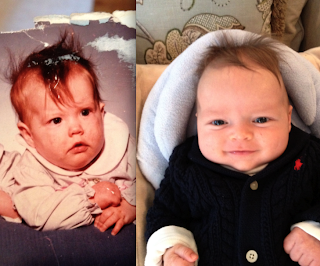A friend of my dad's is connected to Children's Healthcare of Atlanta and was nice enough to do some background work on our doctor. We were very reassured by his report that Dr. Reisner is top-notch. We already felt very comfortable with him but a little positive reinforcement never hurts. He also forwarded an article that I wanted to share.
Sunday Conversation with… Dr. Andrew Reisner
Patients start a brain injury fund in doctor’s name
Posted: 12:00 a.m. Saturday, May 25, 2013
Doctors save lives every day but it’s not every day that patients and their families say thank you by starting a fund in their name. That’s the case with The Andrew Reisner, M.D. Traumatic Brain Injury Fund in honor of the Children’s Healthcare of Atlanta neurosurgeon who has been treating kids for 25 years. The fund was initiated by the parents of Jessica Jones who was 14 years old when Dr. Reisner operated after Jones fell headfirst and was given little chance of survival. Today Jones is a medical student at Case Western Reserve University in Ohio.
More than $60,000 has been donated to the fund since December. The money will support clinical, research and training activities, as well as programs to prevent traumatic brain injuries. “I am incredibly honored and fortunate that my path crossed those with incredibly generous and gracious patients and their families,” said Dr. Reisner, medical director of Children’s neuro-trauma and concussion programs. “I recognize that there is a responsibility to make sure the fund is used appropriately for research, prevention and community needs.”
Q: Are kids’ brains different from adults?
A: Everything about children is different — their physiology, their brain development, the types of diseases they have, their potential to recover.
Q: Are kids more likely to recover from brain injuries than adults?
A: In the first two years of life, the brain undergoes tremendous development, both anatomical and physiological changes. During those years, the brain is particularly vulnerable to disease or injuries. On the other hand, with a child, another part of the brain can take over a function that was done by the injured part. That is pretty unique to children.
Q: What is a traumatic brain injury?
A: The term covers such a wide spectrum, from concussions to severe head injuries. The most common cause of severe brain injuries are motor vehicle accidents. The common causes of concussions are falls at home, sporting injuries, playground accidents and the like.
Q: Can many of these accidents be prevented?
A: If ever the expression “An ounce of prevention is better than a pound of cure” applies, it applies to head injuries. A
big focus of Children’s concussion and traumatic brain injury programs has been enhancing, encouraging and promoting preventative measures such as car seats, bike helmets, taking appropriate action if you think a concussion has occurred.
Q: Has enough attention been paid to preventing head injuries for children who play sports?
A: Georgia has passed the “Return to Play Act” that goes into effect Jan. 1. It mandates that if a child has sustained a concussion, the child is removed from play and returned only after being cleared by a health care provider familiar with managing children with head injuries. The act is long overdue and most welcome.
Q: The fund was started by patients you’ve helped. How many are you unable to help?
A: Unfortunately there are children who don’t survive. Further, there are children who survive but have debilitating and devastating effects that not only affect the child but their family and the community at large.
Q: Are brain injuries in kids something medicine knows a lot about?
A: We do know a significant amount about the underlying mechanism of head injuries but not everything. I have no doubt in the next five to 10 years, we will continue to make great strides in both the understanding and treatment of traumatic brain injuries.
If you would like to donate to the fund, you can do so online:
https://www.giving.choa.org/ReisnerTBIFund










